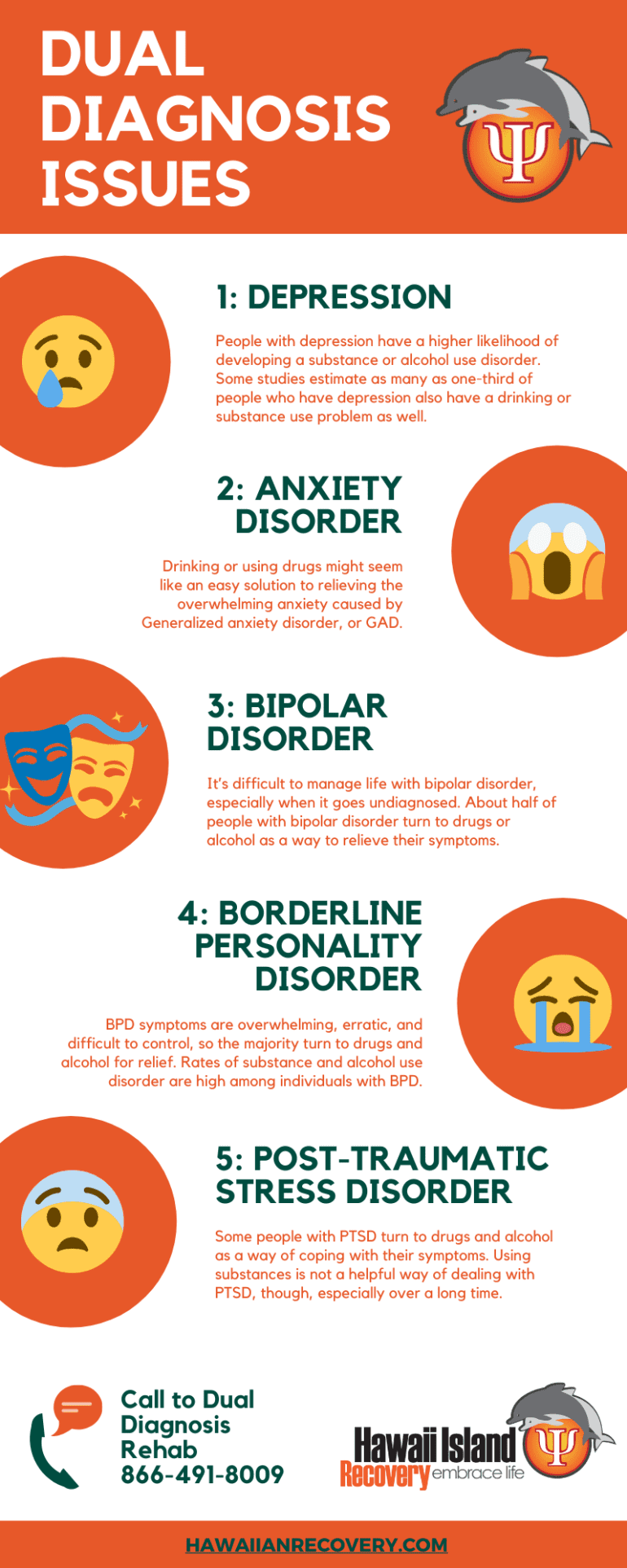Addiction and mental health disorders are intimately intertwined, and it is paramount to address them in tandem rather than as isolated challenges. However, for veterans of the armed forces, their connection can be even more intricate, with a plethora of needs and challenges informing each other each and every day. The transition to civilian life after military service is difficult, and understanding the connection between addictive substances, mental health disorders, and the prevalence of dual diagnosis among veterans is paramount for creating an effective treatment plan at Hawaii Island Recovery.
What Is Dual Diagnosis?
Dual diagnosis describes any situation where an individual is affected by both a mental health disorder and a substance use disorder (SUD) simultaneously. Oftentimes, these challenges continue to inform each other, exacerbating each of their effects and necessitating professional treatment. Dual diagnosis can also take many forms, as any kind of mental health disorder and substance use addiction can qualify for dual diagnosis. Some examples of potential dual diagnosis among veterans include:
- Anxiety disorder and alcohol use
- Depression and prescription opioid addiction
- PTSD and heroin
- Bipolar disorder and methamphetamines
Veterans are also uniquely exposed to challenges and stresses that can inform the development of dual diagnosis in civilian life. For many veterans, the use of prescription medications to address injuries incurred in the line of duty is incredibly common, even if they can be addictive themselves or inform the development of dual diagnosis.

It is critical to engage in balanced recovery to avoid replacing one addiction with another. For more details, call Hawaii Island Recovery at (866) 390-5070.
More infoLikewise, potentially traumatic experiences are commonplace among veterans. For some, this stems from their time in an active warzone, while others may have experienced traumas on base such as traumatic training regimens or military sexual trauma (MST) that can inform the use of addictive substances.
The Complexities of Dual Diagnosis
Dual diagnosis presents a unique challenge for veterans, and professional treatment and dedicated, veteran-specific care are necessary to address them effectively. Addiction and mental health disorders can create a cycle of use that can be exceptionally difficult to break. For example, veterans experiencing depression may look to any possible outlets to overcome such debilitating feelings, and the use of alcohol may seem like an alternative to sitting in such an uncomfortable emotional state.
However, such use of drugs or alcohol can also increase the feeling of depression, especially once its immediate effects wear off, and can even birth further feelings of anxiety, guilt, doubt, and much more. For veterans, the increase in these feelings can further fuel the use of addictive substances, creating a dangerous and destructive cycle. Professional treatment is paramount for veterans to address not just the use of addictive substances but also explore how they are affected by mental health disorders to create a comprehensive and veteran-specific approach to treatment and sobriety.

Despite the necessity of professional programs to address dual diagnosis, many veterans may still be highly reluctant to reach out for professional help regarding their situation. Still prevalent stigmas surrounding veterans and their expectations may cause those who would otherwise benefit from professional treatment to eschew their own needs, either through fear that they would be judged or feel as if they are not somehow “allowed” to express emotional vulnerability due to prevalent military cultures. However, reaching out for professional help is always possible, and Hawaii Island Recovery is committed to deconstructing these barriers for a fulfilling and effective approach to overcoming dual diagnosis among veterans.
Starting Recovery at Hawaii Island Recovery
Overcoming dual diagnosis is complicated, and it can be incredibly difficult to address the myriad of challenges on one’s own. For some, attempts to overcome the use of addictive substances can be difficult if they are not effectively identifying and addressing the impact of mental health disorders. Likewise, veterans attempting to challenge mental health disorders without acknowledging the continued effects that addictive substances have on their mental health can be equally as stifled in their recovery efforts. Only by creating a comprehensive approach can veterans create a healthy future and effective relapse prevention strategies for a sustainable civilian lifestyle.

Hawaii Island Recovery is committed to serving veterans the way that they have served their country, with a number of personalized and dedicated programs all geared toward the unique needs and experiences of veterans. Dedicated veteran programs and trauma-informed treatment professionals are all equipped to not only personalize each recovery program to the needs, mental health disorders, and addiction present for each individual but also to create a community of peers to help challenge and overcome the various forms of dual diagnosis among veterans.
Programs that address physical healing, emotional healing, and spiritual practices are created for each individual. Backed with a communal approach to veteran healing that connects veterans with others who are prepared to deconstruct stigmas and connect over shared experiences, there is always a place to begin the journey of overcoming the effects of mental health disorders, trauma, and addiction for a fulfilling veteran life.
Dual diagnosis presents a unique challenge for veterans pursuing a healthy and fulfilling sober life. We at Hawaii Island Recovery are committed to helping you and your loved ones not only challenge and overcome the use of addictive substances but also the mental health disorders and traumatic experiences that may continue to affect an individual simultaneously. Veterans require a unique approach, and we are committed to providing this kind of dedicated, veteran-specific care to overcome dual diagnosis and create an open and accepting community of veteran peers for a sustainable sober life. For more information on how we can personalize a treatment plan for you, or to speak to a staff member about your needs, call us at (866) 390-5070.
 Hawaii Island Recovery
Hawaii Island Recovery 










